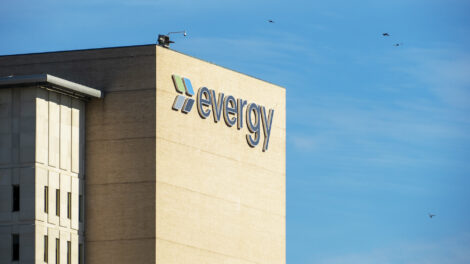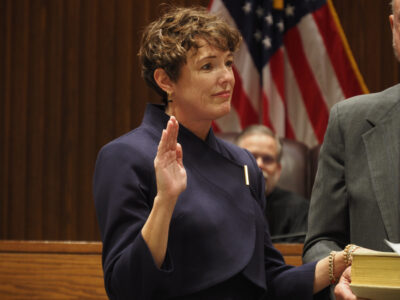Evergy Kansas agreement raises residential base rates 9.6%, pending regulator approval

photo by: Sherman Smith/Kansas Reflector
Evergy Kansas residential customers will see a rate increase of about $9 per month for the average home if the Kansas Corporation Commission accepts a unanimous settlement agreement filed Tuesday.
TOPEKA — A unanimous settlement agreement filed Tuesday at the Kansas Corporation Commission raises Evergy Kansas residential base rates by 9.6%.
A residential customer using about 900 kilowatt hours will see a net increase of about $9 per month on their bill, said Evergy spokeswoman Gina Penzig. That would be in addition to the recent KCC approval to build two natural gas plants and a solar plant, which is expected to increase residential rates 8.6%.
The next move is in the hands of the three-member KCC board, which will begin evidentiary hearings on the rate case Monday. The board is required to sign off on the unanimous agreement and may make changes.
Multiple parties intervening in the case signed off on the agreement, including attorneys representing industrial consumers, school districts, Walmart and businesses.
The parties went into two days of discussions July 8 with vastly different opinions on how much Evergy Kansas Central should receive. The company asked for a $196.4 million rate increase, while intervenors’ proposals ranged from $115 million to $134.7 million.
The parties reached agreement on a $128 million rate increase, which raises the base rates on schools and churches by 9.2% and on industrial customers by 8.4%. The settlement sets the return on equity for investors at 9.7%.
Jim Zakoura, president of the Kansas Industrial Consumers Group, represented the organization’s membership in the settlement meetings. While agreeing to the increase in rates, he raised concerns about how Evergy customers are seeing rates go up consistently.
“While we worked hard, along with others in the case, to reduce the amount of Evergy’s rate increase, because Kansas law permits increases to be based on spending levels by electric utilities, a rate increase on retail ratepayers could not be prevented,” Zakoura said in a statement.
He said recent increases are problematic, pointing to a rate increase of 9.3% attached to the company’s plan to build two natural gas plants and a solar plant, as well as general rate increases that pumped up rates in the past two years.
“This is ‘rate shock’ not seen by Kansans since Wolf Creek began operation in 1985,” Zakoura said. “The extraordinarily high spending levels of Evergy, and the extraordinarily high spending levels directed by the Southwest Power Pool, will continue to require even higher retail electric rates for EKC retail ratepayers in the future.”
The Southwest Power Pool is the regional transmission organization that ensures reliable power supplies and infrastructure.
The 9.3% rate increase tied to building new plants won’t go into effect until 2029 or 2030, Penzig said. Consumers saw a 3.6% increase in the 2023 rate case and a 5.98% increase in 2025, she said.
Secondly, the 9.3% for the gas plants discussion are for rates that don’t go into effect until 2029 and 2030.
As news of the proposed settlement agreement circulated, research analyst Ross Fowler, of Bank of America Securities, sent out an email about Evergy stock.
“This settlement is relatively favorable, with an increase in ROE to 9.7% (vs. 9.4% prior), similar capital structure, and a significant portion of the company’s ask (65%),” he said. “Overall, this highlights that Kansas, a previously contentious regulatory environment, is getting better.”
Penzig said the company since its formation in 2018, when Westar Energy and Kansas City Power & Light merged, has kept rate increases “well below the rate of inflation.” The company was not allowed to ask for any rate increases for five years after the merger.
“Evergy and parties to our rate case reached a constructive agreement that allows recovery of investments made to provide reliable service to our Evergy Kansas Central customers,” Penzig said. “We continue to make our costs more competitive while investing in infrastructure needed to ensure reliable service and support growth in our communities.”







